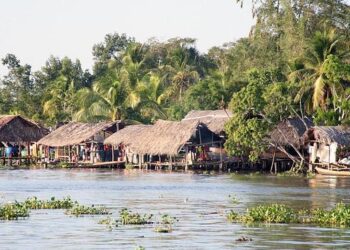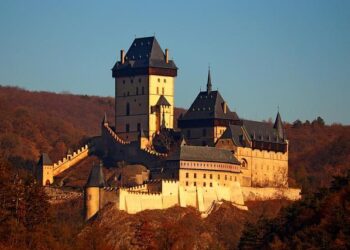The Czech Republic has unveiled ambitious plans to double its nuclear energy output as part of a broader strategy to secure energy independence and meet climate goals. Announced by government officials, the expansion aims to bolster the country’s electricity supply amid rising energy demands and geopolitical uncertainties affecting European energy markets. This move aligns with a growing trend among European nations to invest in nuclear power as a reliable, low-carbon energy source in the race to transition away from fossil fuels.
Czech Republic Accelerates Nuclear Expansion to Secure Energy Independence
The Czech government has unveiled an ambitious plan to significantly boost its nuclear energy capabilities as part of a broader strategy to reduce reliance on fossil fuels and imported electricity. With aging coal plants being phased out and growing energy demands, expanding nuclear capacity has become a priority to ensure a stable and independent power supply. The current objective is to nearly double the country’s nuclear output by commissioning new reactors by the late 2030s, positioning the Czech Republic as a key player in Europe’s energy transition.
Key aspects of this nuclear expansion include:
- Construction of at least two new generation III+ pressurized water reactors.
- Increased investment in local nuclear technology and workforce training.
- Collaboration with European partners to ensure safety and efficiency standards.
- Reduction of carbon emissions aligning with EU climate targets.
| Project Phase | Target Year | Expected Capacity (MW) |
|---|---|---|
| Planning & Approvals | 2025 | – |
| Construction Start | 2027 | – |
| Reactor Commissioning | 2035 | 2,400 |
Challenges and Opportunities in Scaling Up Nuclear Power Capacity
The Czech Republic’s ambitious plan to double its nuclear output faces a complex landscape of technical, financial, and regulatory challenges. Upgrading infrastructure to accommodate new reactors demands extensive investment and cutting-edge technology integration, often constrained by stringent safety standards. Additionally, domestic public opinion and environmental concerns play a crucial role in shaping project timelines, as government bodies work to maintain transparency and build trust. On the regulatory front, navigating the European Union’s evolving energy policies requires strategic alignment, posing both hurdles and pathways to accelerated deployment.
However, these challenges open the door to significant opportunities that could redefine the nation’s energy profile and its position within Europe’s transition to low-carbon power. The expansion can attract foreign investment, foster innovation in nuclear technology, and stimulate local economies through job creation. Moreover, scaling nuclear capacity offers a reliable and stable alternative to intermittent renewable sources, bolstering energy security amid geopolitical uncertainties. Below is a snapshot of key factors affecting the project:
| Aspect | Challenges | Opportunities |
|---|---|---|
| Technical | Integration of modern reactors | Cutting-edge tech and R&D |
| Financial | High upfront capital costs | Attracting foreign investment |
| Regulatory | Complex EU energy policies | Enhanced safety & compliance standards |
| Social | Public skepticism & environmental worries | Job creation & community engagement |
Policy Recommendations for Sustainable and Safe Nuclear Development
To ensure that the Czech Republic’s ambitious goal of doubling nuclear output is both sustainable and safe, policymakers must adopt a multifaceted approach prioritizing environmental stewardship and advanced safety protocols. Investment in next-generation reactor designs that emphasize passive safety features and minimize nuclear waste production should be accelerated. Additionally, regulatory frameworks must be continuously updated to reflect the latest international standards, reinforcing stringent oversight and transparent reporting mechanisms. This includes fostering collaboration with European nuclear agencies to align safety standards and emergency preparedness strategies.
Public trust and workforce readiness are equally crucial components. Effective communication strategies should be implemented to engage local communities and address concerns transparently, cultivating informed public support. Meanwhile, expanding specialized educational programs and vocational training aimed at nuclear engineering and safety will secure a skilled talent pipeline essential for long-term operational excellence. The following table summarizes key focus areas for sustainable and safe nuclear expansion:
| Focus Area | Action Points | Expected Outcome |
|---|---|---|
| Technology | Deploy advanced reactors; waste reduction | Safer operations; environmental benefits |
| Regulation | Update safety standards; international coordination | Enhanced oversight; risk mitigation |
| Community Engagement | Transparent communication; public forums | Increased trust; social license to operate |
| Workforce Development | Specialized training; career pathways | Skilled staff; operational excellence |
Closing Remarks
As the Czech Republic moves forward with ambitious plans to double its nuclear energy output, the decision underscores a strategic push towards energy security and carbon reduction within the broader European context. With new reactors on the horizon, the country aims not only to meet growing domestic demand but also to position itself as a key player in the continent’s transition to low-carbon power. How this expansion will influence regional energy dynamics and address environmental concerns remains a pivotal development to watch in the coming years.
















